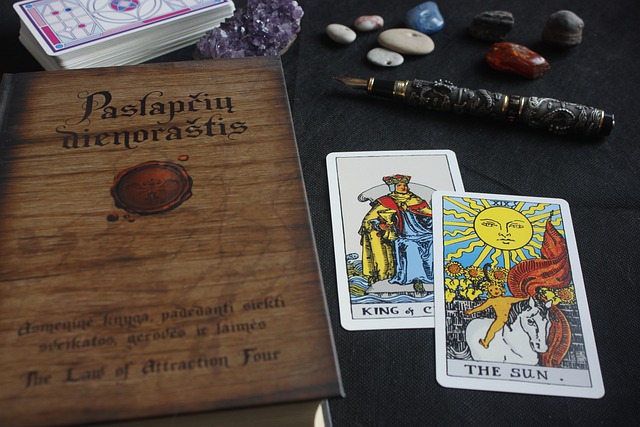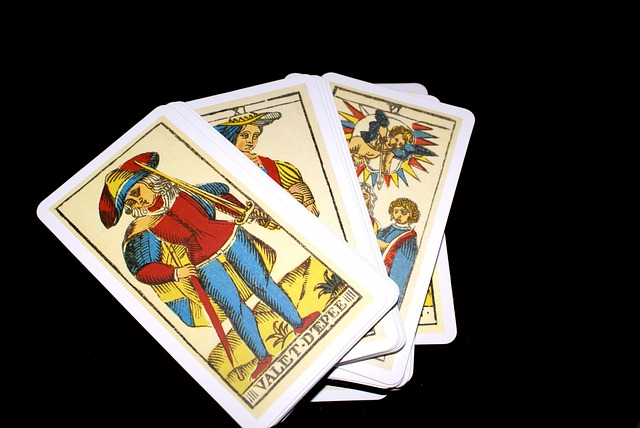
There are several ways you can learn to be a tarot reader. A solid understanding of the symbols used in the tarot deck and intuitive sense are essential. It's also important to practice. A reference tarotcard is the first step in learning to read tarot. You will then want to practice and build a positive energy source.
As a tarot reader, you can earn a living.
You can give advice to clients who have complex issues and need a detailed reading. To be more accurate, however, you will need to have a basic understanding of how the cards work. The cards can also be used to predict the future. Tarot readers are able to tell people when something is going wrong, which can help them prepare.
You will need to shuffle the cards and arrange them in a spread when you conduct a reading. This spread can be any one of ten cards or twenty-four cards, and will help you answer a question.

A tarot reference card is available
Knowing the meaning of each card can be very helpful when learning how to read tarot. Understanding the meanings can help you answer complicated questions. A tarot card reference is a great way to get a better understanding of the symbols. Tarot card references are essential when you're working on your reading skills. They will also help you identify which cards to use to answer which questions.
Many books are available to help you understand the meanings and symbols of the tarot cards. The majority of them will have small tarot reference cards that simplify the meanings each card into a few sentences. However, you should remember that tarot is an interpretive tool and you should learn to build your own idiom and language for interpreting the tarot.
You can learn to read the tarot card.
One of the most important things you can do if you want to become a tarot reader is to practice. Tarot reading will enhance your intuition and help you see the larger picture. You should not make assumptions about what the tarot decks mean. There are many layers of tarot cards. Your interpretations will be different than others.
Learn the meanings and symbols of the tarot cards before you can learn to read them. After you have studied the meanings of each card, practice reading the tarot in real conversation. By doing this, you will be able connect the cards and understand the spreads. It's like learning a new language. You have to practice a lot and keep improving.

Build a positive energy network
One of the best ways to become a tarot reader is to develop a positive energy field. This helps you listen to the cards' messages and can help others. It allows you to build stronger relationships with people. You can use it to perform healing rituals, set goals, and practice mindfulness. You will feel more in touch with your intuition and the energy from the cards if you create a sacred space to hold your readings.
A tarot card reader should not receive too many details.
While tarot card readers have the power to provide you with a psychic reading, it is important to avoid giving them too much information about yourself. Even if you are interested in their advice, make sure they are reputable and trustworthy. Too much information can cause them overstate their capabilities. They can also make incorrect predictions. Do not trust anyone who makes extravagant promises or exploits you emotions to win business.
Tarot is mysterious and has many unknown powers. Too much information could reduce the mystery and suspense of the reading. A tarot reader who gives too much information may lose the mystery and suspense of the reading, just as you would tell a friend how the Ouija board's planchette works.
FAQ
What are your top hobbies?
You can find the best hobbies that you love doing for yourself. It will be easier to continue doing what you love if you are passionate about your work. If you don't feel well or tired, you will always have an excuse!
Hobbies that we all know and love include gardening, painting and crafts, photography, cooking, sports and games, reading, music, film-making, collecting, cycling, walking, dancing, writing, playing instruments, etc.
Another option is to volunteer at a local charity shop.
Suppose you're looking for something more adventurous. Take up skydiving or rock climbing, parasailing, parasailing and paragliding.
You can spend your time outdoors in many different ways, including spelunking, snowshoe hiking, snowshoe hiking and more. These include caving, cliff diving, cave tubing, abseiling, sea kayaking, rafting, canoeing, climbing, trekking, bushwalking, mountaineering, backpacking, trail running, orienteering, off-road driving, quad biking, motorcycling, motorcycle riding, dirt bike riding, jet boating, hang gliding, hang gliding, parachuting, hang gliding, heli-skiing, ice skating, snowmobiling, snowshoeing, snowshoeing, cross country skiing, downhill skiing, telemark skiing, ski touring, sled dog racing, snowboarding, snowkiting, snowmobiling, spelunking, snowshoe hiking, snowshoeing and many more.
Is it possible for a hobby to make you rich?
Not necessarily.
However, if you're interested in creating a business based on your hobby, then you could definitely end up being wealthy.
Let's assume you like cooking. You love healthy food and decided to open a restaurant.
You only serve organic, homemade meals and you charge a small amount to customers to cover labor costs.
You can grow your clientele over time and eventually hire employees who will work alongside you.
You will eventually be able to expand your menu with vegan options and gluten-free choices, as well as desserts.
This scenario allows you to have the lifestyle you want and a business you can be proud of.
However, you don't have to quit your day job.
Instead, you could simply run your restaurant while still holding down your regular 9-5 position.
Where can you find free resources that teach more about hobbies and interests?
There are many websites dedicated to helping people discover new hobbies.
Here are some of the favorites:
www.trythisathome.com - This site provides a list of over 100 different hobbies. It also provides information on how to get started in each one.
www.hobbyfinders.org: This website offers thousands of activities you can search by skill level, location, or interest.
www.indiebazaar.co.uk - IndieBazaar is an online marketplace designed specifically for independent artists and musicians. The site has hundreds of products, from artwork to music equipment.
www.pinterest.com/explore/hobbies - Pinterest is a social media network that lets users "pin" images they find interesting onto their boards. Users can use boards to organize their favorite things into specific categories.
www.reddit.com/r/Hobbies Reddit is another social networking platform that allows users to link to articles, videos or other content. Users can vote on the posts they consider most valuable.
What's a hobby?
A hobby for kids is any activity they like to do as part of their normal daily routine. Some kids like to build things, draw, paint, write, or play with toys.
Many parents worry that their children will get into trouble if they're allowed to do whatever they want. It is not true. This is true even if your child isn't causing harm to anyone or their own safety, then they won't be in trouble.
It is important to keep in mind that just because someone likes something, doesn't mean they will choose it every time. For example, if they love drawing pictures but they hate writing, then they may decide to draw pictures instead of writing.
There are many types of hobbies. It's up to you to choose one that you really enjoy.
Can I make money from my hobby?
You can have many hobbies that lead to extra income.
If you're passionate enough about your hobby, you may decide to sell items related to it.
If you are a stamp collector, you might want to start a website that sells rare stamps.
This way, you can earn extra income without having to go through the hassle of actually buying and selling the stamps.
You could also create a YouTube channel to talk about your hobby.
This allows for you to share your passions with others and can potentially generate additional income by providing premium content.
What are observation hobbies?
Observation hobbies can be activities that you watch people do. This could be watching sports, reading books or going on holiday. You could also observe other people.
You can learn creativity through observation hobbies. You can apply this knowledge later on when you work with others.
You will discover that learning is easier when you are interested.
For instance, if football is something you are interested to know about, you can watch the game or read a book. You could visit or take part in exhibitions if you are interested in learning more about photography.
If you enjoy playing music, you could play along to songs online or buy a guitar.
If you like cooking, you could cook your own meals or visit restaurants.
If you love gardening, you might grow vegetables or flowers.
If you are a fan of dancing, you can join a class or go out with your friends to learn.
If you enjoy painting, you might paint pictures.
You could also write poems or stories if you enjoy writing.
If you like drawing, you could draw pictures.
If you have a passion for animals, you might be able to look after them or work in a zoo.
If science is your passion, you might choose to study biology or chemistry.
History lovers can watch films, read books or listen to podcasts.
If you enjoy travelling, you might consider exploring your local area or traveling abroad.
Statistics
- The intensity of the dialogue partners' bond at the end of the forty-five-minute vulnerability interaction was rated as closer than the closest relationship in the lives of 30 percent of similar students. (time.com)
- In comparison, men in the “no humor” condition were refused 84.6% of the time and were only accepted 15.4% of the time. (time.com)
- I am 100% biologically a woman (discover.hubpages.com)
- A new survey by Pew Research Center of teens ages 13 to 17 finds that 36% of girls feel tense or nervous about their day every day; 23% of boys say the same. (pewresearch.org)
- 37% Video Games 36% Travel 36% Health and Fitness (quizexpo.com)
External Links
How To
How to choose the right hobby
Ask yourself some questions to find out if your hobby is right.
-
Do I enjoy doing it?
-
It gives me pleasure?
-
Are you interested in continuing this hobby even after your age?
-
Do I have any skills?
-
Can I improve?
-
Would I recommend it?
-
It can bring me happiness.
-
Will it help me to relax?
-
Is it going to make me feel better?
-
Will it teach me skills that I can use later in life?
-
It will allow me to meet new friends.
-
Can I express my creativity through it?
-
Is it possible to learn new skills?
-
Is it going to give me the confidence?
-
Do I feel accomplished?
-
It could lead to financial success.
-
Is it possible to travel with it?
-
Is it possible to go on new adventures?
-
It will encourage me to exercise.
-
Is it going to inspire me?
-
Will it motivate me to succeed?
-
What activities will I be required to do?
-
Can it be a challenge?
-
Is it going to be enjoyable?
-
Is it going to keep me fit?
-
It will save you money.
-
It will it lower stress levels?
-
Will it stop boredom from happening?
-
Will it free up my time?